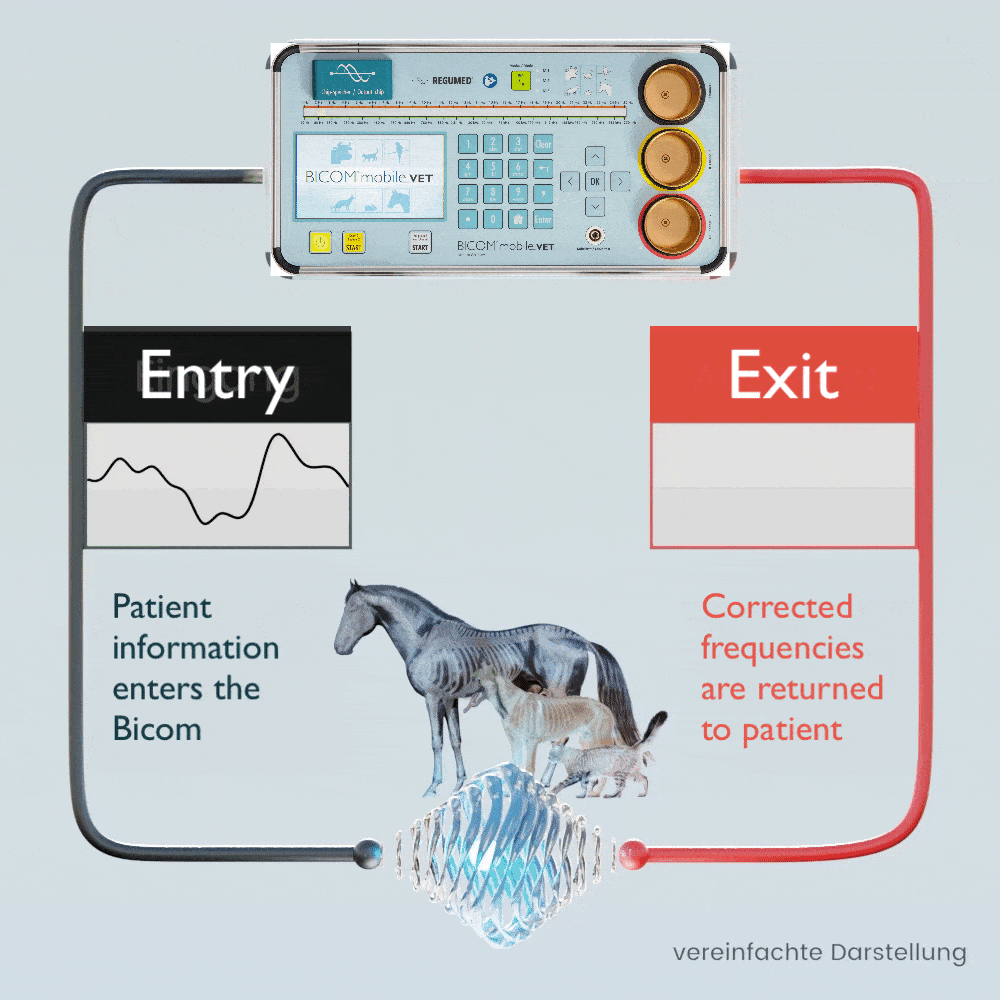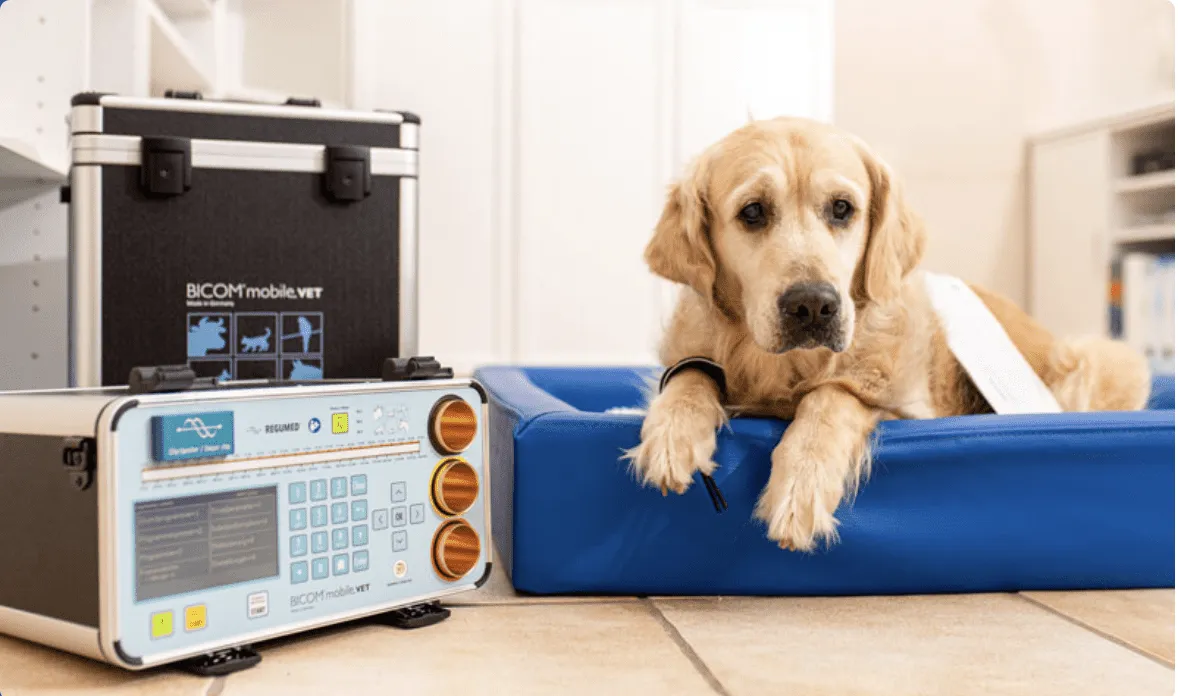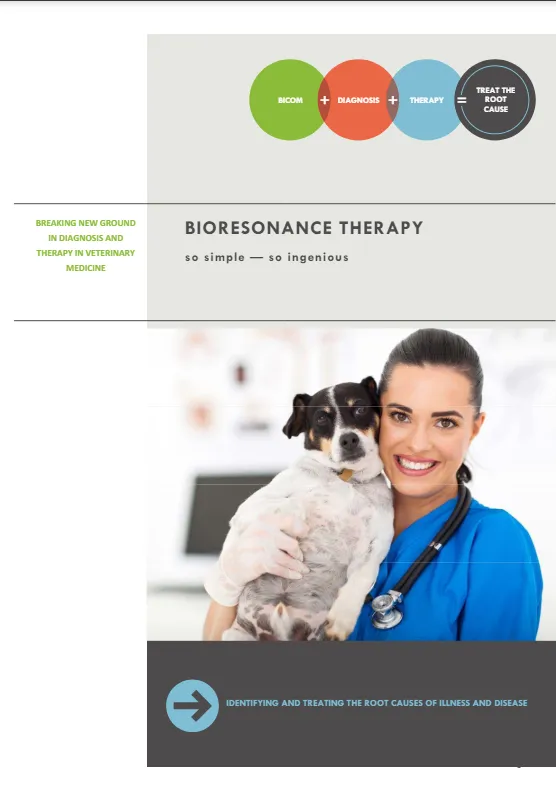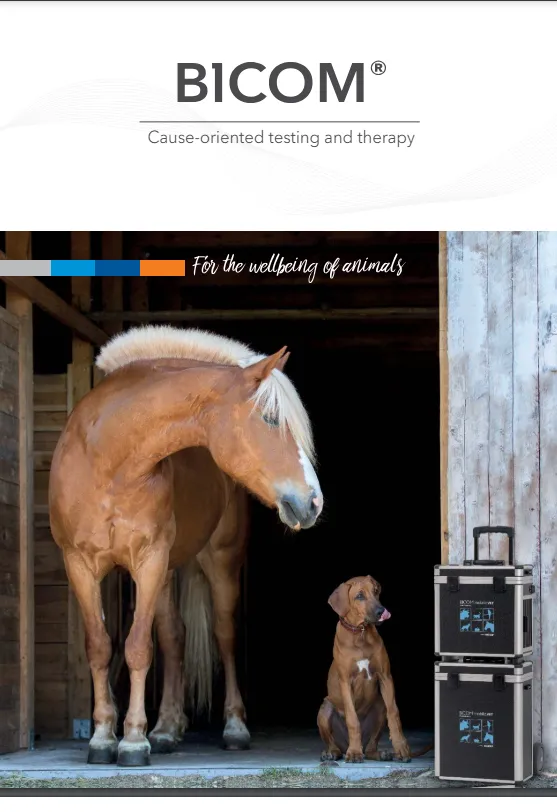Treatment with the help of the patient’s own information
in the BICOM® mobile VET bioresonance device
In contrast to other “frequency therapy devices”, BICOM® bioresonance is a method that is highly individual and perfectly tailored to the needs of the patient through the use of the patient’s own information and the possibility of testing specific wave patterns for resonance.
The patient’s own pathological and physiological information is recorded using special applicators and fed into the BICOM® mobile VET.
Depending on the therapy program, the specific wave pattern as a carrier of information is amplified, weakened or inverted and transmitted back to the patient in modulated form, which means that the transmission of information changes in clarity depending on the modulation or it disappears completely.
The treatment signals continuously adapt to the changing pathological situation of the patient. As the therapy progresses, the body’s ability to regulate is reactivated.
Find out more about this topic at our regular events. Together with veterinarians and animal naturopaths, we offer various face-to-face and online events .
The BICOM® bioresonance method is a cause-oriented, holistic treatment concept. It can narrow down the cause of the health problem in animals and find out even the hidden causes of the clinical picture.
Animals have a natural regulatory system that can also compensate for unusual influences. However, even good self-healing powers eventually reach their limits. Persistent exposure to allergens, environmental toxins, fungi, viruses, bacteria or stress and changed living conditions weaken the immune system and are often the cause of an illness. In particular, fungal infestation on the skin or chronic diseases in general are not always due to a breeding-related genetic defect, but are signs of a disturbed immune system.
The BICOM® bioresonance method is the key to successful diagnosis and therapy, especially for animals that cannot tell us exactly where it hurts or what the symptoms are. It is a gentle form of therapy that can be carried out without side effects and without additional stress for the animal.
The BICOM® mobile VET records the bioenergetic state of the animal, processes the information it contains and returns modified vibrations / therapy frequency patterns to the animal. Symptoms and stress can be diagnosed and targeted therapy can be initiated.
Through the use of endogenous and exogenous substances, the body’s own self-healing powers can be activated and imbalances that have existed for a long time can also be regulated.
REGUMED Medizintechnik are pioneers of the BICOM® bioresonance method. More than 30,000 therapists worldwide, well over 10,000 of them in Germany, successfully use their therapy concept.

Biophysical basics of the bioresonance method
Life is only possible when three conditions are met: matter, energy and information.
We also find these aspects in conventional medicine, both in diagnostics and in therapy. For example, every drug is also a carrier of information.
Information is neither energy nor matter, it is immaterial and comparable to the meaning of a message from a sending to a receiving system.
In addition to the electrical processes in the receptor proteins and biomembranes in general, electromagnetic interactions through light (biophotons) also play a role in cell communication and the transmission of information.
Specific electromagnetic wave patterns act as information carriers. These wave patterns can be modulated by the BICOM® device in order to eliminate disturbing or stressful information in an organism.
The goal is to restore the free flow of healing information (cell communication) and thus support the self-regulation of the organism and the self-healing powers.
Individual, patient-specific information or information from native substances, digitized substances or information stored on storage media can be used for therapy.
What your colleagues are saying…

Dangers of Bioresonance: What You Must Know Today
The Hidden Dangers of Bioresonance You Should Know
Bioresonance therapy is gaining popularity in wellness and alternative medicine circles. Marketed as a non-invasive treatment that reads the body’s frequencies and “corrects” imbalances, it promises help for issues like allergies, chronic fatigue, and even emotional trauma. However, beneath the surface of these appealing claims lies a growing concern about the dangers of bioresonance.
While some users claim benefits, researchers, medical professionals, and regulatory bodies have raised serious questions about its safety, accuracy, and effectiveness. This blog explores the documented risks and controversies, helping you make a fully informed decision before engaging in this therapy.
How Bioresonance Is Supposed to Work
Bioresonance devices are designed to detect electromagnetic waves from the body and adjust them using feedback signals. The idea is that by correcting “faulty” frequencies, the body can heal itself. Proponents say it can treat everything from food sensitivities to depression. But the scientific community has consistently asked a critical question: Where is the clinical evidence?
Lack of Scientific Support
One of the primary dangers of bioresonance is that it lacks rigorous scientific backing. Peer-reviewed studies that support its effectiveness are limited, often poorly designed, and lack reproducibility. The British Medical Journal and Cochrane Reviews have found no strong evidence that bioresonance can diagnose or treat medical conditions reliably.
This absence of proven results creates a major risk. People suffering from real health conditions may delay evidence-based treatment in favor of a therapy that may do nothing at all, or worse, cause harm by omission.
Risk of Misdiagnosis
Another danger of bioresonance lies in misdiagnosis. The therapy often claims to identify pathogens, allergies, and intolerances through frequency readings. However, many patients report wildly inconsistent results from different machines or even the same machine on different days.
Inaccurate diagnoses can lead to unnecessary lifestyle changes, stress, or even medication avoidance. A false sense of security from these incorrect results may cause people to ignore serious symptoms, delaying accurate medical treatment.
False Promises and Ethical Concerns
Bioresonance clinics often promise dramatic results: detoxification, cancer support, mental health recovery, and more. These claims are appealing, especially for people who feel let down by traditional medicine. However, such statements can be dangerously misleading.
Health organizations, including the Federal Trade Commission (FTC) in the U.S. and the Advertising Standards Authority (ASA) in the UK, have taken action against clinics for making unverified claims. The ethical concern is significant: charging people for a service that offers no guaranteed benefit crosses into exploitation, especially when targeting vulnerable individuals.
No Standard Regulation
One of the biggest red flags is the complete lack of international regulation. Bioresonance machines vary widely in design, calibration, and function. Most are not FDA-approved or certified by any major health authority. This means anyone can purchase a machine, start a clinic, and advertise treatment without medical training.
In the hands of unqualified individuals, the dangers of bioresonance multiply. There’s no oversight, no quality control, and no guarantee of safety.
Psychological Impact of False Hope
For people battling chronic illnesses, hope is powerful—but false hope can be damaging. Patients may believe they’re getting better due to the placebo effect or simply because they want the therapy to work. When no real improvement occurs, the emotional crash can be devastating.
In some cases, people who once trusted bioresonance turn away from conventional treatment altogether. The psychological harm, combined with worsening physical symptoms, can lead to long-term damage.
Financial Exploitation
Costs for bioresonance sessions can range from $50 to over $300 per visit. Some clinics push long-term packages, promising results that rarely arrive. This financial burden is especially troubling when the therapy has no confirmed benefits.
Families often pay thousands out of pocket, driven by desperation or persuasive sales tactics. This expense, without assurance of value, adds another layer of risk.
Case Studies and Expert Warnings
Several high-profile investigations have uncovered the misleading nature of bioresonance clinics. In Germany and the UK, consumer advocacy groups have published reports highlighting how operators failed basic diagnostic tests or exaggerated their devices’ capabilities.
Experts from the World Health Organization (WHO) and Harvard Medical School have stated that bioresonance falls short of accepted medical standards. Many classify it as pseudoscience with no place in clinical care.
Evidence-Based Alternatives
If you're seeking relief from chronic conditions, allergies, or fatigue, there are scientifically tested options available. These include:
Cognitive Behavioral Therapy (CBT) for anxiety or depression
Elimination diets are monitored by certified dietitians for food intolerances
Allergy testing conducted by board-certified allergists
Medical detox programs are supervised by professionals
While these may not be as trendy or immediate as bioresonance, they are backed by real data and accountable practices.
When Curiosity Becomes a Gamble
Trying new health methods isn’t inherently bad. Exploration is part of personal wellness. But when that curiosity leads to unregulated treatments with no scientific foundation, it becomes a gamble, often with your health on the line.
The dangers of bioresonance are not always physical; they also affect emotional well-being, finances, and your long-term trust in healthcare. Making informed choices starts with separating fact from fiction, no matter how convincing the claims may sound.
Why Bioresonance Marketing Feels So Convincing
The way bioresonance is marketed can easily make anyone believe it works. From sleek websites to confident practitioners, the message is carefully crafted. Words like "energy healing," "cellular detox," and "non-invasive therapy" sound harmless—even beneficial. Some testimonials share dramatic turnarounds that tug at your emotions.
But this marketing often masks the lack of medical proof. Experts warn that these stories, while powerful, don’t replace real data. The trust built through emotional storytelling is part of why so many people fall into the trap, especially when they’re desperate for relief.
Celebrity Endorsements and Online Hype Add to the Risk
In recent years, some influencers and celebrities have promoted bioresonance therapy on social media. While it may seem like a harmless endorsement, it can mislead thousands. People often assume that if a well-known figure is using it, it must be safe or effective.
Unfortunately, these endorsements rarely mention the lack of scientific backing. They focus on personal experiences rather than medical facts. This blend of fame and anecdote adds pressure to try something that might not work—and could even be dangerous if it delays actual treatment.
Lack of Global Health Authority Support Raises Alarms
Despite its growing popularity in wellness circles, bioresonance therapy has not been approved or endorsed by any major health authorities such as the World Health Organization (WHO), FDA, or NHS. These organizations require robust scientific evidence before recommending any treatment to the public.
Their silence—or outright warnings—shouldn't be ignored. If a treatment truly worked at the level many practitioners claim, it would be widely used in hospitals and clinics worldwide. The absence of global backing highlights a serious credibility gap that users should be aware of.
Emotional Vulnerability Makes People Easy Targets
People often turn to bioresonance therapy when conventional medicine fails or when they are going through emotional distress. This vulnerability makes them more open to trying anything that promises hope, relief, or healing.
Unfortunately, this is where bioresonance becomes especially dangerous. It offers the illusion of control and care, which can delay proper diagnosis or treatment. Being emotionally drained shouldn’t mean being misled—and sadly, that’s what often happens when science takes a back seat to hype.
Conclusion
The dangers of bioresonance are more than just theoretical—they're real risks backed by poor evidence, false claims, and misleading practices. From misdiagnosis and unqualified providers to financial and emotional harm, this therapy poses serious concerns. While the promise of a simple, painless cure is tempting, it's crucial to prioritize safety and science when it comes to your health. Always consult qualified healthcare professionals before exploring alternative therapies.
FAQs
1. What does this energy-based therapy claim to do?
It claims to detect and correct imbalances in the body using electromagnetic frequencies. Supporters believe it helps with chronic conditions and overall wellness.
2. Is this treatment medically approved?
No, it is not approved by major medical authorities like the FDA or NHS due to lack of scientific evidence supporting its safety or effectiveness.
3. Are there any side effects from using it?
Some users report dizziness, headaches, or fatigue. More importantly, it can delay real medical treatment, which is a serious concern.
4. Why do some people still believe it works?
Placebo effects, emotional testimonials, and influencer endorsements create a strong illusion of success, even without clinical proof.
5. Can it replace conventional medicine?
Absolutely not. It should never be used as a substitute for evidence-based medical care, especially for serious health issues.
Treatment Priorities
For gentle and optimal treatment of the causes of diseases in animals
The BICOM® bioresonance method is predestined for use with large and farm animals such as horses , but also with dogs , cats and small animals. The treatment focus of the BICOM® mobile VET is wide-ranging. It is now used for many indications.
It recognises health deficits at an early stage and is used, among other things, for the following symptoms:
sweet itch
Feed intolerances
allergies and related diseases
COB/COPD
leishmaniasis
Lyme disease
anaplasmosis
lameness in horses
hoof ulcer
Poisoning by poisoned baits, plants etc.
mauke
Feline infectious peritonitis (FIP)
Cat flu/cat disease
eye/conjunctivitis
and much more
Get advice now!
Our experts are happy to be there for you personally
Our BICOM® bioresonance experts are available to answer any questions you may have
and will be happy to advise you personally and individually.




Request more information
Quick Links





Facebook
Instagram
Mail